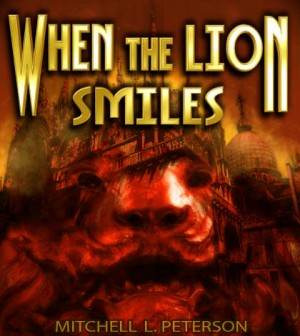“No, Signor, not this one, this one instead. Fifty, I charge fifty.” He spoke as he handed an almost identical purse to Martin.
He turned his full attention back to Andrea and the two resumed their quarrel. The men ignored Martin as they bickered, rattling the words from their mouths in rapid-fire succession, gesturing vigorously as they spoke. Martin turned the bag over and noticed a medium scratch on the side. No, he would not buy one that was scuffed. He picked up the one the Marocchino had taken from him and then reached for his wallet for yet a third time that morning.
“Here you go.” He said but the man did not hear him immediately.
“Sir?” Martin asked again as he looked to the sky. More large drops of rain began to fall.
Ciccio turned, took the money and said, “Grazie,” before resuming his verbalizations with Andrea.
Andrea stopped short, put his hands on his hips, looked at Martin and then to Ciccio.
“Allora,” he asked incredulously, “e la cambio?”
Martin leaned in and spoke softly to Andrea. “Forget it. Let him keep the change. Let’s just go.”
Ciccio shoved the bills into his pocket and after looking sideways at Andrea, pointedly thanked Martin.
“Grazie Signor. Multo gentile.”
Martin took Andrea by the arm. “Come on,” he said “before it starts raining again.”
“Who is this crazy man?” Andrea thought to himself.
Martin could see that the short man who had befriended him was disappointed.
“I know, I know the borsa whatever. Look, I’m wet, cold, tired and hungry. Besides, I didn’t come half way around the world to argue and fight. I’m on vacation.”
An invisible object was brushed from Andrea’s face before he spoke, shrugging nonchalantly as he did so.
“Bene Signor, andiamo, let us continue.”
~
Ciccio had been right not to trust Andrea completely.
“That little bastard!” He thought to himself.
The price he had demanded of the American was not unfair. It was the same price he charged to everyone, but if the American had no sense to bargain it was not his fault! Andrea should not have interfered. What did he know? His life was simple, direct. He made his money; he went home to his warm house, his wife, his children if he had them.
“He should not have interfered!” He thought again.
Oh, what did it matter? The American had allowed him to keep the difference and Ciccio would go home a wealthy man anyway, wealthier than he had ever been in his life. All it required was that he be careful. The bags that this Bruno came for commanded great sums of money, and Ciccio was fortunate to be in a position to collect that money.
~
As Andrea led the way, they hurried along; corner after corner, jostling other shoppers, winding and twisting along until Martin was sure that he would be lost forever. As they wound through the tiny streets deeper into the interior of Venice, the canals became less frequent but even still, every few alleys there would be yet another bridge to cross and another modest waterway idly flowing toward the lagoon. It stunned Martin that a city so old could be so alive. The streets were choked with passers by. All around him the noise and bustle of commerce and life simmered and echoed off the stone buildings. It was disorienting and fascinating all at the same time. The shops were full of clientele, the taverns filled with men and women who had stopped to sip a coffee and have a piece of bread or a roll before resuming their day. On the walks, rich Venetian women hurried by him cloaked in full-length furs, a sight not common in America with the advent of animal rights activists. It wasn’t that he agreed with them, or that he disagreed, it was simply different than anything he had ever encountered; like the black and white photos of the rich and famous of the thirties and forties in New York or Hollywood; something reminiscent of an America that no longer existed except in old news reels or Life Magazine pictures; an America that was, even at the time, largely illusion but wonderful to look at and dream about.
As the rain began to fall harder, steadier, a multitude of umbrellas in every color, shape and size bloomed on the shoulders of the people in the street and as they passed one another on the narrow esplanade, each doffed their parasol to one side in a delicate ballet of choreographed movement that lacked only the angelic strains of a Strauss waltz. He could almost hear the ritornelle: step, two, three; bow, two, three; greet, two three; smile, two three. The people, ever nimble as dancers, stepping around each other, flowing down the avenue as graceful as swans, moved with all the effortlessness of a bow over the strings of a finely crafted violin.
A matronly woman impeccably coifed, dripping with gold and dressed in a mink coat, encountered a man in an overcoat and hat and as they came within inches of each other, their umbrellas tilted, one to each side in an unspoken pre-arranged sequence like cars on a track in a carnival ride; tilt, down, side, up, resume. He could hear voices calling greetings; vendors hawking their wares; the clinking of glassware, silverware and the thousands of vociferation melting with the rain as it seeped into the gutters and it suddenly struck him what seemed so odd about it all. Though courtly and genteel, it looked almost contrived, like a stage set in the theater. Martin laughed out loud, he couldn’t help it; it was wonderful!
Andrea stopped and turned to him. “What is amusing?” He asked.
“I don’t know if I can explain it.” Martin answered.
“Ah, yes: Venice. Is different from your America, no?”
“Not exactly different,” Martin began to explain as he drew abreast of his new friend, “I mean yes, very different but it’s not that precisely, it’s more like a stage set in a play, a theater production.”
“Truly?” Andrea asked. “This?” He questioned as he gestured to the city around him.
“The city,” Martin replied, “the life; this.” He finished as he waved his hand about the street and all its seemingly carefree inhabitants.
“Ah.” Andrea replied. But he didn’t understand and Martin knew it.
“We are here, Signor.” Andrea said as he stopped before a large paneled wooden door with a brass plate sign that Martin could not read.
Andrea rang the bell and after a moment’s pause they were buzzed in. Once inside, Andrea removed his coat, hat, gloves and scarf and slipped his dripping umbrella into the stand. Martin set his newly purchased bag down behind the stand, mindful not to drip water in the entryway and began to remove his coat and things. Andrea instructed him to leave his coat on.
“But it’s wet.” Martin protested.
“Yes, but this man must to see it. Roberto? Dove sei?” Andrea called out as they walked down a short hallway.
“Roberto!” Andrea called again as they stepped into a small salon.
A tall thin man, exquisitely dressed looked up from his work at a tailor’s mannequin near the center of the room. His white shirt was starched beyond the envy of the staunchest of professional military men. His French cuffs perfectly pinned with gold links, his dark blue trousers consummately fitted and his shoes positively gleaming. His hair was a soft white, combed straight back in large waves and cropped stylishly close to his head. His facial features were as exacting and as delicate as his clothing. He considered Martin only briefly before smiling warmly and approaching Andrea with an outstretched hand.
“The Little Fucking Man!” He exclaimed in heavily accented English.
Andrea broke into a wide grin and the two exchanged a handshake and kisses to each cheek.
Andrea turned back to Martin and said,
“A moment, Signor.” And then turned his attentions back to Roberto.
“But what brings you out on such a morning?” Roberto asked in his native tongue.
Andrea gestured subtly toward Martin as he spoke, “My friend here.” He answered.
Roberto scrutinized the American and frowned. “His is coat Italian, but who fitted it to him, a blind man?”
The two men began their conversation and Martin understood nothing, except one or two words here and there. He turned to catch the full view of the shop. It was exquisitely lighted from a single three-tier chandelier, medallion mounted in the center of the ceiling. There were eight arms to each level, each annular stage successively smaller than the first, that hung gracefully down and at the ends was a cup with a tulip shaped bulb. A ring hung on each arm with a dangling flower attached and standing straight up from each limb, a single stemmed glass daffodil bracketed by flowing crystal leaves. It was colored a light pink and at the edges of each translucent segment, a frost of what looked to be real gold. Finely scrolled moldings capped the walls where they met the ceiling and on each was a fresco. Each was lighted on either side by a bough-armed sconce of the same fine glass as the chandelier. The floor was a single piece of marble and Martin wondered how it had been secured into place all those centuries ago without breaking it.
“Good God…” Martin breathed to himself, “This place is amazing!”
He thought of his tailor’s in San Jose and recalled it looked more like a Salvation Army garbage dump. Clothing and bolts of cloth were strewn about in great heaps with such careless abandon that he had wondered how they escaped the notice of the local Fire Marshal. The floor was liberally littered with pins and needles, so much so that it was a considerable risk and health hazard to walk anywhere in the shop without one’s shoes. It was dark, dank, smelled of dust and mold and yet the man was a true craftsman when it came to fitting Martin’s suits. But this place, this should be a museum exhibit! Martin shook his head. How in the world could these people concentrate in the midst of such assiduous finery? He took a step forward to look more closely at the fresco on the nearest wall. It was cracked, worn and looked to be authentic. And yet, here it was in a tailor’s boutique. Was all of Venice like this? How could it not be?
He was suddenly aware that the shop was silent and that Andrea and his friend were watching him. He turned to meet their gaze and then Roberto spoke.
“Is beautiful, no?”
“Yes.” He answered.
“Is a Tintoretto.” Roberto said matter of factly.
“You’re joking!” He stammered.
~
When the Lion Smiles © 2011 by Mitchell L. Peterson
All rights reserved. No part of this book may be reproduced. Stored in a retrieval system or transmitted in any form or by any means without the prior written permission of the publishers, except by a reviewer who may quote brief passages in a review to be printed in a newspaper, magazine or journal.
First printing.
This is a work of fiction. Names Characters, places, and incidents either are the product of the author’s imagination or are used fictitiously. Any resemblence to actual persons, living or dead, event, or locales is entirely coincidental.
PublishAmerica has allowed this work to remain exactly as the author intended. Verbatim, without editorial input.
Available in Paperback, Kindle & Nook editions, and in Hardcover from, PublishAmerica, Amazon & Barnes and Noble.
PUBLISHED BY PUBLISHAMERIC, LLLP
Balitmore.


















